The following story was recorded in 1994, from Bill Henderson's book "Escape From The Sea".
James Layton
Pharmacists Mate First Class
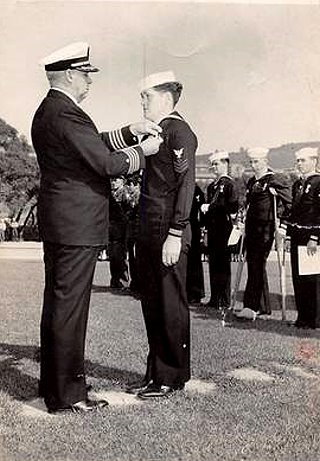
L to R
Captain Dearing. Oakland Navy Hospital. James Layton.
|
Jim was awarded the Navy and Marine Corps Medal for his meritorious conduct on Vella Lavalla. Following is the recommendation written by Captain Cecil.
"For exceptional meritorious performance of duty as a member of a group of survivors of the USS Helena during the period they were marooned on an island of the Solomons group. James Grant Layton, pharmacist's mate second class, U. S. Navy, by his execeptional skill, and devotion to duty was largely responsible for saving the lives of three wounded men. His courageous conduct throughout was in keeping with the highest traditions of the United States Naval Service."
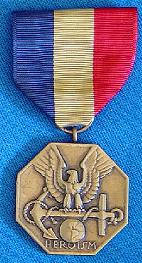
Navy and Marine Corps Medal
|
Island Medic
I was nineteen when I joined the ship at Espirito Santos in January 1943 as a pharmacist second class. My battle station the night we were sunk was with the repair party located by the gedunk stand on the second deck. Our job was to repair damage sustained during the battle or at least to minimize the damage. My particular job, as a pharmacist mate, was to treat the wounded.
There were probably ten or twelve of us in the repair party. I don't remember all the names but two of them do stand out in my memory even after fifty years. One, a slightly built young man from Arkansas nicknamed "Arky" could not swim, and I wondered how he managed to get through boot camp without passing the navy's swimming test. The other, a Chief, was an excellent swimmer who was on the navy's swimming team.
Most of us in the repair party were sitting down when the battle started, but after the second torpedo hit I started to get up and was still in a bent over position when the third one exploded directly beneath our station. The force of the explosion was so great that it hurled me, in that bent over position, straight up into the overhead. It didn't knock me out but I had one hell of a backache. Years later when I finally went to the hospital for treatment the doctors told me I had several cracked vertebrae and ruptured discs.
When that torpedo hit we not only felt the shock but also saw the flash from the explosion. When our compartment started to flood we headed topside, although we didn't get the word to abandon ship, it was obvious we had to leave.
I went up the ladder and through the scuttle in the hatch to the main deck. I remember seeing "Jelly Belly", the Chief Watertender, who must have weighed three hundred pounds go through that scuttle while wearing a kapok life jacket. Had I not seen it I wouldn't have believed it was possible.
When I got to the main deck it was so dark I couldn't see the water. I took off my shoes and jumped in, expecting to fall fifteen or twenty feet, but the drop was actually about three feet. I swam out from the ship and sometime later got to a life raft holding about twelve other men.
I later heard from the chief who was on the navy swim team, that as he was swimming away from the ship as fast as he could someone wearing a life jacket passed him. H e couldn't believe anyone could swim that fast, so he called out asking who it was. Arky, the non swimmer said, "It's me, Arky," and kept right on going.
I don't recall how long we were on the raft until we came within talking distance to one of the rescue destroyers, but before we could get alongside someone on deck shouted for us to stay clear because they were getting underway. We kicked with our feet and paddled with our hands to get the raft away from the destroyer. That was the last contact we had until we were rescued from Valla Lavella.
The next morning we could see the bow of the Helena still floating, later in the day we were buzzed by Japanese zeros. When the first one came at us, we all jumped into the water and swam away from the raft, not wanting to be grouped together in case the planes started to strafe. As I recall they made three very low passes but I don't know why they didn't strafe us, maybe they weren't sure if we were American or Japanese.
None of us slept the night of the sinking so we began our three days adrift in a near exhausted condition. The raft was upside down, and it was impossible to turn it upright. The emergency rations of food and water were submerged and couldn't be retrieved. The only water we had was what little we could collect when it rained, and we had nothing to eat.
I don't remember whether we had an officer on the raft or that anyone assumed command. There was no confusion or disagreements. Everyone took his turn either sitting on the sides of the raft or in the water hanging on. Those in the raft kept a lookout for any sign of rescue, and that kept up our hopes.
The nights were the toughest. The water was warm but there was a chill to it, and the sky so dark we couldn't see the islands. It was impossible to measure any progress we might be making toward them. Our spirits seemed to sink with the sun.
When sleeping, I'd hook my arm through the ropes attached to the raft. Fortunately no one floated away when they fell asleep or swam away because of hallucinations, so we didn't lose anyone.
When I left the ship I had a small leather case about the size of a package of cigarettes attached to my belt. It contained a very small supply of morphine syringes. It was really very basic, not worthy of being called a first aid kit. One of the men on the raft was suffering from severe stomach pains so I gave him a shot of morphine to ease his pain.
We could see the islands but without sails or paddles we could only drift. One of the men, from the navigation department, thought the island we were headed for was Vella Lavella. It didn't make much difference since we went where the tide and wind took us.
We arrived at the island in the afternoon of the third day, and waded about seventy five or a hundred yards to the shore. None of us had shoes so going over the coral to the beach was no picnic. We took the raft in with us and hid it under the brush. We were exhausted and wanted to do nothing but crawl into the brush, out of sight, and sleep. We discussed posting a guard but nobody actually stood watch. We all just passed out from exhaustion. The next morning a flight of zeros going just above the top of the trees awakened us.
Shortly thereafter a native approached and wanted to know if we were American or Japanese. We told him American and he said "follow me." some of the men didn't think much of that idea but there was really nothing else we could do.
We traveled all that day and to make walking a little easier we covered our feet with material from our kapok life jackets, and finally arrived at a pier with a dock and a small hut nearby. That night we slept in the hut, and the next day the natives took us up into the hills where Sylvester, the missionary and many of our shipmates were hidden. It had been a very long hike.
There were several wounded men in camp. The less serious cases were men suffering from painful salt water sores, but one man had a compound fracture of his leg, another a broken hip and the Chaplain had severe salt water sores that kept him immobilized. Their days adrift in the rafts must have been extremely painful.
Vick walker, one of the other pharmacists mates in camp, and I took care of the injured, doing what we could to ease their pain. There were no bandages, but Sylvester had a small supply of sulfa drugs that we used to prevent infection, and I still had a few morphine syringes. Fortunately, all of the wounded survived.
We were in a primitive place and our medical treatment was extremely limited. We made splints for the man with the broken leg, enabling him to get around camp with the help of his shipmates. The Chaplain and the man with the broken hip were not mobile but we gave them morphine for the pain and tried to make them comfortable.
The injured, sheltered in a small hut to protect them from the heat and rain, were always the first to be fed. Vick Walter and I supplied their food but they were able to feed themselves. I don't recall how they relived themselves or if they ever went to the latrine.
Most days were routine but once we were alerted that a Jap infantry patrol was headed our way up the trail. Major Kelly took his group of volunteers to intercept them, and we made ready to move our patients further up into the hills. The Jap patrol went back down the trail when a flight of our planes strafed their base.
There was not much for the men to do in camp. Some went for water every day, others stood guard duty, some did camp chores, but for the most part the men just rested.
Some of the men were more active than others. One such man was Lloyd Miller from the engineering department. Lloyd was a leader in organizing things around the camp. He was a few years older than most of us and just seemed to know what to do, and had the energy and leadership to do it.
We were very fortunate to have officers such as Major Kelly, Lt. Commander Boles, and Lt. Commander Chew in command. We were a large group of stranded sailors on an enemy occupied island, and effective command and control was essential for our care and security. I don't recall that anyone doubted that we'd be rescued.
The one man to whom we all owed so much was Sylvester. I had almost daily contact with him and in my opinion he was quite a man. He was the major player in organizing the natives to rescue many of our shipmates from certain death at sea, and getting them safely into camp. He took care of our food, shelter, medicine, and security. But more than that he gave the spiritual aid that held us together.
He also had the natives well organized. His leadership was such I don't think they realized he was in command of them. The natives were men you would want on your side in any war. They could hide behind a tree no bigger than your arm and disappear into the jungle without a trace, and then suddenly reappear with big machetes in their hands. It was the weapon they used in their fight with the Japanese patrol and the weapon they used to execute the Jap prisoner they couldn't control.
After our rescue I returned to the United States and worked at the Oak Knoll navy hospital in Oakland, California until the end of the war.
To see a recent picture of Jim, click Here.
The following are Jim's WWII awards.

Navy Unit Commendation

Good Conduct Medal
|
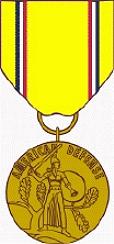
American Defense Medal
|

American Campaign Medal
|
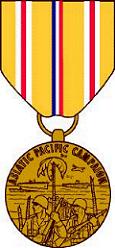
Asiatic Pacific Medal
With Eight (8) Battle Stars
|
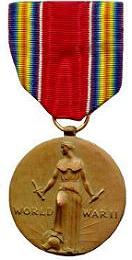
World War II Victory Medal
|


